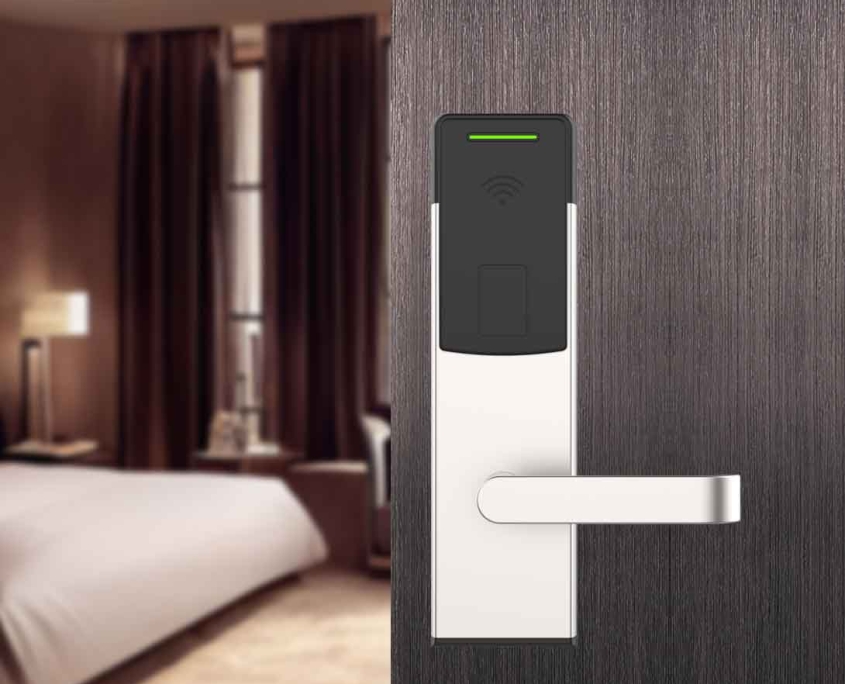How Do Hotel RFID Locks Work?
If you’ve stayed in a modern hotel recently, you’ve probably used an RFID key card to unlock your room. Gone are the days of clunky metal keys—today, most hotels use contactless RFID locks for convenience and security.
But how do these high-tech locks actually work? And are they really safer than traditional keys?
In this article, we’ll break down:
-
What RFID hotel locks are and how they function
-
The technology behind RFID key cards
-
Security risks and how hotels prevent hacking
-
Why hotels switched from magnetic stripe cards to RFID
By the end, you’ll understand exactly what happens when you tap your key card—and why this system is now the gold standard in hospitality.
1. What Are RFID Hotel Locks?
RFID (Radio-Frequency Identification) locks are electronic door locks that use wireless signals to communicate with a key card, smartphone, or wearable device (like a wristband). Instead of inserting a magnetic stripe card (like a credit card), you simply hold the key near the reader, and the door unlocks.
How They Differ from Old-Style Hotel Keys
| Old Magnetic Stripe Keys | Modern RFID Keys |
|---|---|
| Require swiping (like a credit card) | Work with a quick tap |
| Prone to demagnetization (from phones, magnets) | No risk of demagnetization |
| Easier to copy or hack | More secure encryption |
| Wear out over time | Longer-lasting |
Why Hotels Love RFID Locks:
Faster check-ins (no key cutting)
Better security (harder to duplicate)
Remote management (front desk can disable lost keys instantly)
2. How Do RFID Hotel Locks Work? Step by Step
Here’s what happens when you use an RFID key card at a hotel:
Step 1: The Key Card is Encoded at Check-In
-
When you arrive, the front desk programs a blank RFID card with a unique digital code.
-
This code is linked to your room number and stay duration (e.g., 3 days).
-
Some hotels now use mobile keys (via smartphone apps like Hilton Honors or Marriott Bonvoy).
Step 2: You Tap the Card on the Door Reader
-
The RFID lock has a small radio antenna inside the reader.
-
When you bring the key close (within 1-2 inches), the lock sends a low-power signal to the card.
-
The card’s embedded RFID chip responds with its encrypted code.
Step 3: The Lock Verifies the Code
-
The lock’s system checks if:
-
The code matches an active key.
-
The key hasn’t expired.
-
The key is authorized for that room.
-
-
If everything checks out, the lock’s motorized bolt retracts, and the door opens.
Step 4: The Key is Deactivated at Check-Out
-
When you leave, the front desk removes the key from the system, so it no longer works.
-
If you lose a card, the hotel can instantly deactivate it and issue a new one.

3. The Technology Behind RFID Key Cards
RFID hotel locks use passive RFID technology, meaning the key card doesn’t need a battery. Here’s how it works:
A. Inside the RFID Key Card
-
A tiny microchip (smaller than a grain of rice) stores encrypted data.
-
A copper antenna wire receives power wirelessly from the door reader.
B. Types of RFID Frequencies Used in Hotels
Most hotel locks operate on:
-
Low-Frequency (LF) RFID (125 kHz) – Older, less secure (can sometimes be copied).
-
High-Frequency (HF) RFID (13.56 MHz) – More secure (used in modern hotels and credit cards).
C. Why RFID is More Secure Than Magnetic Stripes
-
Magnetic stripe cards store static data (easy to copy with a skimmer).
-
RFID cards use dynamic encryption, making each transmission unique.
-
Some systems use military-grade AES-128 encryption.
4. Can RFID Hotel Locks Be Hacked?
While RFID locks are much safer than old magnetic keys, they’re not 100% unhackable. Here are the risks—and how hotels protect against them:
A. Potential Security Risks
-
Card Cloning
-
Cheap RFID copiers can sometimes duplicate older 125 kHz cards.
-
Solution: Hotels now use 13.56 MHz (MIFARE) cards, which are harder to clone.
-
-
Relay Attacks (Wireless Signal Interception)
-
Hackers use a device to extend the RFID signal, tricking the lock into opening.
-
Solution: Some locks now have distance detection to prevent long-range attacks.
-
-
Master Key Exploits
-
If a hacker steals a hotel’s master key data, they could access multiple rooms.
-
Solution: Regular key rotation and secure key management software.
-
B. How Hotels Keep RFID Locks Secure
Frequent Key Rotation – Codes change often, so stolen keys expire quickly.
Mobile Key Encryption – Smartphone keys (like in the Marriott app) use Bluetooth or NFC with extra security.
Audit Trails – Hotels track every door entry, so suspicious activity is flagged.
Bottom Line: While no system is perfect, modern RFID hotel locks are far more secure than traditional keys.
5. Why Did Hotels Switch from Magnetic Stripe to RFID?
Hotels started adopting RFID locks in the early 2000s, and today, over 80% of major hotel chains use them. Here’s why:
Benefits for Hotels
Faster Check-Ins – No need to program magnetic cards one by one.
Reduced Key Failures – No more demagnetized cards from phones or magnets.
Remote Management – Staff can disable lost keys instantly from the front desk.
Benefits for Guests
No More “Key Doesn’t Work” Issues – RFID cards rarely fail.
Mobile Key Options – Unlock your room with your phone (no card needed).
Eco-Friendly – RFID cards last longer, reducing plastic waste.
6. The Future of Hotel Locks: Beyond RFID
RFID is already being upgraded with even more advanced systems:
A. Smartphone-Based Access (NFC & Bluetooth)
-
Many hotels (like Hilton and Marriott) now let guests use their smartphone as a key.
-
Uses NFC (like Apple Pay) or Bluetooth for secure, contactless entry.
B. Biometric Locks (Fingerprint & Facial Recognition)
-
Some luxury hotels (like the Wynn Las Vegas) test fingerprint scanners.
-
Pros: No key cards to lose. Cons: Privacy concerns.
C. AI-Powered Security
-
Future systems may use AI to detect suspicious behavior, like repeated failed access attempts.
Final Thoughts: Are RFID Hotel Locks Safe?
Yes—modern RFID locks are secure, convenient, and here to stay. While no technology is completely hack-proof, today’s systems are far more reliable than old magnetic stripe keys.
Tips for Hotel Guests Using RFID Keys
Keep your key away from phones & magnets (even though RFID is more resistant).
Use mobile keys if available (less risk of losing a physical card).
Report lost keys immediately so the hotel can deactivate them.
Next time you tap your key card, you’ll know exactly how that little chip keeps your room secure!
Have You Ever Had an RFID Key Fail? Share Your Stories Below!
(And if you’re curious about the best hotel locks, ask us for recommendations!)









